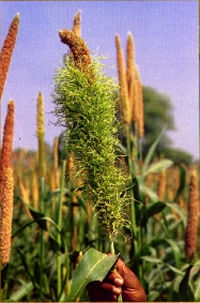PSP RESEARCH OVERVIEW - MOLECULAR MARKERS
Ten years ago when most of the world still viewed molecular marker technology as un untested luxury, a collaborative John Innes Centre-ICRISAT project was funded by the DFID PSP to develop molecular techniques for the breeding of crops for developing countries. Drought
and downy-mildew disease resistance in pearl millet
Drought
and downy-mildew disease resistance in pearl millet
PSP-supported research has produced the first pearl millet marker-assisted backcrossing program to transfer downy-mildew resistances and drought tolerance genes into commercial hybrid parental lines in India.
Single-cross hybrids are now the most widely grown pearl millet cultivars in India and grown by all categories of farmers. There are many pearl millet hybrids from private-sector programmes, but public sector-bred hybrids, such as HHB 67, is one of the most extensively grown. This particular hybrid is now grown on at least 400,000 ha in Haryana and Rajasthan, and is starting to succumb to downy mildew after more than 10 years of widespread and repeated cultivation.
At the beginning of 2005, PSP-supported research resulted in the release by the Haryana State Varietal Release Committee of a new hybrid, HHB 67 Improved, which is not only more resistant to downy mildew but has a better yield performance. Click here for further details (pdf)......
Visit the PSP project database and virtual library for further details of the above projects.
PSP AT A GLANCE
Website Constructed and Maintained by C.M. Stirling.